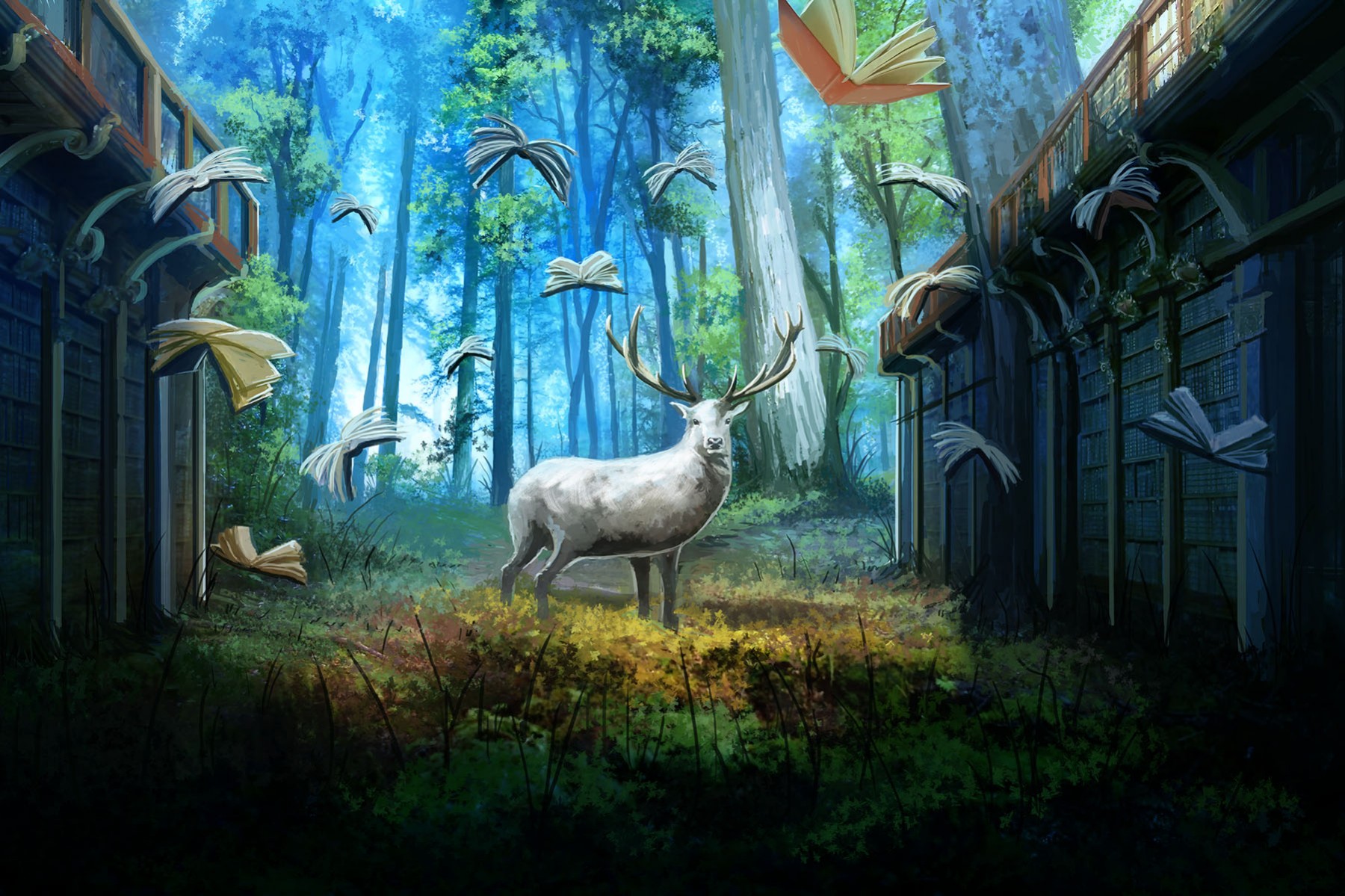At the time of the Usurper, Esorik and her people lived beyond the mountains and had done for some time. Their island fell like a teardrop from the northeast side of the land, into that broad sea that was at once their livelihood, their conceptual foundation, and their best argument for independence—physical and spiritual—from the mainland, of which, in truth, they were an integral part. On her Labor days, Esorik was a fish-salter. She greeted the Ekalbia on the docks, and showed them where to hang their huge silk nets. Stronger women than she emptied the nets; cannier women negotiated with those bloody-minded, green-eyed nomads over the price. Esorik’s task was to heave the little gray fish by the spadeful onto her pallet of squat rectangular tubs, then pack them in salt. Sometimes, as she did this, the sun set in pink and purple bands across the horizon, and on those occasions, she felt almost grateful for Labor days and understood their purpose. The rest of the time she smelled of fish. Salt got into any little cut on her hands. She looked forward to her final cycle.
On Praxis days, she was a teacher: she taught the children of her district how to tell stories and more importantly the names of the various forms. The Snake with the Tail in Its Mouth. The Resurgence. The Straight Arrow. The Sinking Ship. As Praxis, it was rather pathetic, being so close to Esorik’s own Anima—which was storytelling itself—but she was good at it and besides she had little choice: her Anima was almost all of her. She possessed no hidden talents. She could not add, build, invent anything real, configure, organize or lead. She knew brilliant women on the island, many, friends of hers, whose lives were the soul of variety, who, on their Labor days, built bridges, and when their Praxis came, designed civic systems or sat on justice committees. She knew women who did all of this and then, to display their Anima, danced through the streets with colored ribbons streaming from their joints, singing founding songs at least as old as the paving beneath their feet. But Esorik was a storyteller pure and simple. Who had learned—though not without some struggle—as much as anyone can know about the packing of fish in salt.
When the Usurper was first put in power, Esorik behaved like most island people. She called him the “Usurper” although he had been chosen, however misguidedly, by the people, and she encouraged everyone in her circle to spit on the floor three times whenever his name was mentioned. She presided over a circle of five—two males, two females and herself—and they were now in their fourth cycle, Esorik having had her children fifteen years earlier, whom Lohim and Seg had then cared for—while she educated herself and worked in the world outside their compound, and spread her passions thinly within it. But Lohim and Seg, men in their thirties at the time of the Usurper, found the moment for their own divergence had come, and of course now dear Leela and Ori were pregnant in their turn. At the very moment the Usurper took power, then, Esorik was deep into the satisfied, ripened period of her life: re-greeting her children, saying farewell to Lohim and Seg, seeking new lovers and fresh passion, and preparing to put her island duties aside—Labor, Praxis and Anima entire—so as to care for the soon-to-be-born. And it was because of this fullness in her own existence, perhaps, that she had experienced the Usurper, initially, as only the intrusion of the worldly on the intimate. She did not see why the story of her life or anybody’s should be so profoundly distorted by this monstrosity from the mainland. In her time she had met many people of the outer archipelagoes who, when you traded with them, did nothing but bemoan the corruption of those who ruled over them, and often seemed, to Esorik—who did not believe she lived in a comparable state of emergency—distracted by their own misery, monomaniacal in their fixation upon a justice beyond their grasp. Yes, Esorik had known many such people, and felt profoundly sorry for them, but in her innocence, she had never imagined she could so easily become one of them. For a period, she had an urge to petulantly refuse the new situation. At the same time, some part of her always understood this reaction to be both childish and typical of an older woman who had seen many cycles. She kept it to herself.
• • •
Like most people on the island, she considered it her civic duty to supervise, within her circle, the construction of a bier—in their case a bier of walnut and silver, the building of which took fourteen days—and then to lay their youngest member upon it, bound and blindfold, topped and tailed by candles. With at least a million others, they rolled out their bier on the assigned night, down to the closest shore. As had been hoped, the circumference of the island was thus lit up, and it was visible from the mainland—an entire generation mute and alight—of which vision the mainland took note, as did the Usurper, and none of it made a whit of earthly difference. Yet she felt better. It made sense to the storytelling part of her, which, as we have seen, was almost all of her, even though these old forms of story, popular on the island, appeared to the mainland to be antique and idealistic and the very reason the Usurper had found such favor in the first place. The Usurper, for his part, placed his youngest girl—his circle was only young girls—on a gimcrack bier, covered in flowers, in the sunstruck middle of the day, and gave a vulgar public address as he loomed over her body, in which he ridiculed men like Lohim and Seg and the very concept of the cycle. Like many others, Esorik recognized this address as the oldest story form of them all—The Father Who Eats His Young—but knowing a thing, and accepting it calmly—as only another rhythm in the infinite cycle—are very different matters.
• • •
She became enraged. Like many storytellers, she entered his mind, even though, on the island, this remained wholly prohibited: a gift long ago set aside so that other gifts might flourish. His mind was exactly as everyone had expected, it writhed and it oozed. It was an abomination. But it was satisfying to have that fact confirmed at least, and soon details were everywhere, circulating as songs and riddles, filthy jokes and rhyming curses, for though Esorik told no one of what she saw, many others, motivated by the common rage, were far less circumspect, and having so little respect for what they uncovered inside the Usurper, felt within their rights to spread the news far and wide, without caution, heedless of the island’s oldest taboo. The dock women, for example, with whom Esorik packed fish—whose labor was, by necessity, eight tenths of their cycle—sang the ugly new songs as they worked, cackling and whooping at the end of each vicious line, as familiar now with the workings of the Usurper’s mind as any seer or storyteller. Such barbarism became general. Hunting the white hart returned to fashion. Friends of Esorik, people she’d known for years, turned their circles into hunting parties and chased that elusive animal through its habitat, stabbed it in multiples of seven—seven strokes each—and then stood over the poor beast’s heaving belly as it bled out into the earth and over their shoes. Behavior like this had not been seen for thirty cycles or more, but as long as the Usurper venerated the white hart and believed it to be the source of his power, the creatures themselves were considered fair game, killed in reality to repudiate a symbol.
• • •
Esorik did not sing the songs or hunt the harts, but years later, looking back on that tragic period, she reflected on the many ways, small yet significant, in which she had contributed to the breaking of all the cycles she had ever known. She remembered that when teaching The Canker in the Rose, for example, teaching it over and over—it became the only form she could bear to impart—the children would get bored of the repetitive lesson, and stray from their circle under the tree, gathering instead in smaller groups to sing the ugliest songs and imagine the ritual dismemberment of the Usurper, or the fiery destruction of the mainland and the emergence of a self-determining island, fantasies they had heard adults in their own circles repeat, and which they now retold, with great verve and excitement, as if they were mere fairy tales from the fireside . . .
Yet when Esorik had heard the children speak in this way, she had not stopped them, in fact she’d often encouraged them, even laughed, for the Usurper was one of whom you could say anything, think anything. He was a universal license. Cycles became meaningless. Everybody circled only around him. And when he singled out the Ekalbia, for living nowhere and trading with everyone, some part of Esorik, at the time, in that atmosphere of madness, had found it a satisfying story that so many of the Ekalbia’s little curraghs should have sunk a mile from the mainland, drowning Ekalbia men, women and children, their compact sable bodies appearing for months later at the shoreline, their bright green eyes as still as sea glass. All because the Usurper had not granted them the right to dock on one of the stormiest nights of the year, which tragic tale had only proved her point, it simply demonstrated the ruthlessness and barbarism of the Usurper, and of all who followed him—and what else is a story for?
THE END

‘The Canker‘ by Zadie Smith was first published in her collection of short stories ‘Grand Union‘.
